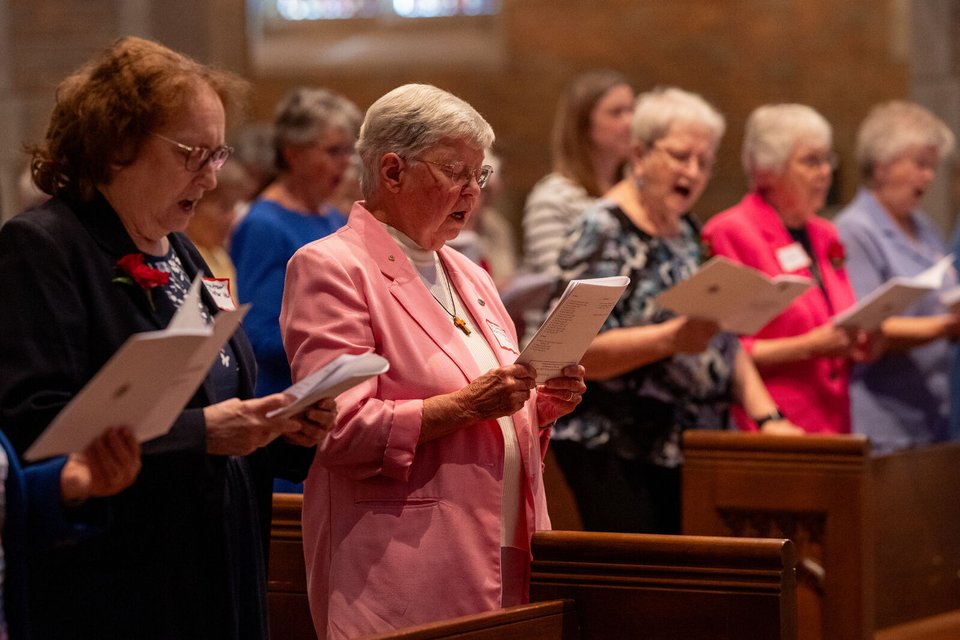 Courtesy WHAS-TV
Courtesy WHAS-TVIf you had made this drive 34 years ago, as I did, you would have shared the narrow roads with wide-bodied coal trucks, which always seemed to be in a hurry. In the center of town, just across the railroad tracks, you’d find St. George Catholic Church, built by the coal company that built Jenkins.
 Ned McGrath
Ned McGrathAs the 1980s began, the religious order founded by Mother Teresa, the Missionaries of Charity, was invited to minister in Appalachia by the Diocese of Covington. Mother Teresa herself was involved in the selection of Jenkins because it was one of the few places in this corner of Kentucky that had a Catholic church.
Fast forward to this weekend, and those parishioners — the entire community for that matter — are taking a special and personal interest in the canonization ceremonies for Mother Teresa at St. Peter’s Square in Rome. They, like me, are recalling fondly the quality time spent with a future saint. The Catholic community is also anticipating the Mass at St. George next month with their bishop presiding.
Back in spring of 1982, four of Mother Teresa’s nuns were sent to Letcher County and moved into a house in Jenkins that had once been a barbershop and beauty parlor. After evening Mass, on their walk home, the sisters would stop at local homes, sharing stories and smiles, but most of all, listening.
The Oblate priest serving as pastor at St. George Parish, Fr. Edward Randall, told me at the time he thought it was “most commendable” that the sisters came to town months ahead of schedule to assess the needs of the people. “They’ll find their niche,” he said, “and they’ll do fabulous work. I’m sure of that!”
Jenkins was the first rural mission for the Missionaries of Charity, and because of that, it received its fair share of advance publicity. By mid-June, with “their niche” identified, Mother Teresa came to Kentucky to officially launch a ministry to battered women and their children, something needed and quietly welcomed in Jenkins and Letcher county.
As a reporter at the CBS affiliate in Louisville, Ky., WHAS-TV, I made the seven-hour trip to Jenkins to cover Mother Teresa’s visit. A coal town with a “boom-and-bust” economy, Jenkins was, for the most part, down on its luck in 1982. Unless there was a tragic mining accident to report, the news media rarely found places like Jenkins. The police chief told me he thought Mother Teresa would be the biggest thing to happen here since Eleanor Roosevelt visited in the 1930s.
In opening the new facility, I saw firsthand the organizational and logistical skills of Mother Teresa. She already had her eye on another piece of property, where she could expand her shelter and, at the same time, build a playground for the children. And her sense of humor surprised us all, agreeing to take a picture of one of the newspaper photographers with his camera. “You better smile,” she told him.
When I had the opportunity to interview Mother Teresa, I asked her, among other things, “…why smiles are so important?”
“When we smile,” she told me, “we get a smile back.”
“Yes,” I said, “but I would think it must be hard for many of the people you work with to smile … they’ve had such a rough time of it.”
“It is much easier,” Mother Teresa explained, “to get a smile from our people than from people who are pre-occupied with other things. Our people — the poor — are free.
“For (the Missionaries of Charity) … poverty is freedom,” she continued. “It allows us to love Christ with undivided love … to love and serve Him in the distressing disguise of the poor.”
A missionary priest from India is now the pastor at St. George. Fr. Santosh Madanu is a member of the Heralds of the Good News, a religious order focused on vocations and with a special devotion to the ministry and legacy of Mother Teresa. A phone call last week confirmed the Missionaries of Charity are still working in Jenkins, which continues to struggle with the closure of nearby mines, and more recently, drug abuse.
The sisters — there are still four of them — visit nursing homes in the area, the sick, the poor, the elderly, the jails. They bring food baskets and, when and where needed, financial help to pay the bills of the poorest of the poor. As Fr. Madanu says, the sisters, every day, make extraordinary efforts to “… bring their whole-hearted service to the needy.” They never stop making efforts so that “ … people will love God and love their neighbors.” They listen, and they bring smiles to the faces of the people in Jenkins.
That’s what Mother Teresa would want them to do.
Ned McGrath is Director of Communications for the Archdiocese of Detroit and associate publisher of The Michigan Catholic. The TV documentary he produced on Mother Teresa, “Mission in the Mountains,” is being re-broadcast this month on the Catholic Television Network of Detroit (CTND) and is available at http://store.aod.org.









